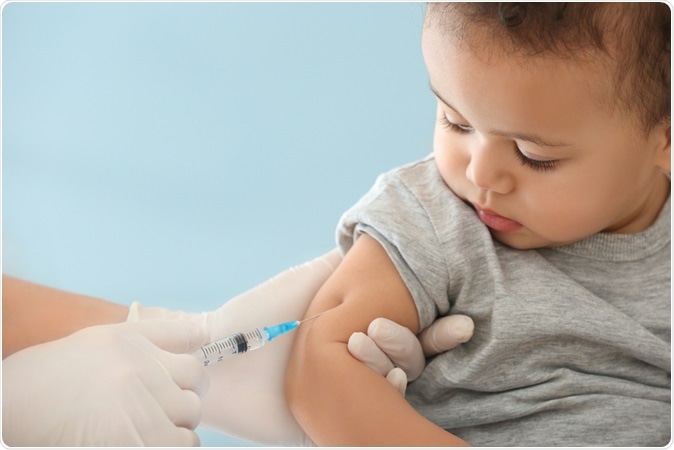Vaccination conspiracy theories and false information regarding vaccination safety has led to decline in vaccine uptake among millions of parents for their children. This has resulted in the comeback of infections that could be prevented by widespread vaccination such as measles, whooping cough etc.
The World Health Organization has numbered anti-vaccination strategies or Anti-vaxxer groups as one of the top ten threats to global health in 2019. Many of the vaccine-preventable diseases such as diphtheria, polio, hepatitis A and B, chicken pox, influenza, mumps, yellow fever, German measles or Rubella, in addition are set to infect the unvaccinated populations, warns the WHO. The WHO added that vaccines are one of the greatest innovations in science and save nearly 2 million lives annually. The WHO website statement says, “Vaccine misinformation is a major threat to global health that could reverse decades of progress made in tackling preventable diseases.”

Doctor vaccinating child - Image Credit: Africa Studio / Shuttersrtock
Facebook has made a positive move in this direction by assuring that they would allow their users as well as users of Instagram, Facebook Search, Groups, Pages and forums to find the actual facts about vaccines and prevent spread of false information and advice on vaccines. The WHO has welcomed this move by one of the largest social media in today’s world. Millions of users now would be directed straight to the WHO pages on vaccine information in English and other languages when the users search regarding vaccine safety. This would ensure that the actual messages reach people and they are not misguided by the anti-vaccination groups. For individuals living in the United States, the search functions would lead them to the accurate vaccine information on the United States Centre for Disease Control and Prevention (CDC) websites.
This collaboration between the health agency and the social media giant is a result of several discussions over the past few months. This would prevent spread of inaccuracies and allow propagation of correct information on vaccines says the WHO.
The WHO Director-General Dr Tedros Adhanom Ghebreyesus, in a statement on the WHO website has said, “Major digital organizations have a responsibility to their users -- to ensure that they can access facts about vaccines and health. It would be great to see social and search platforms come together to leverage their combined reach. We want digital actors doing more to make it known around the world that #VaccinesWork.”
The WHO statement added, “We want innovation that supports healthy behaviours to save lives and protect the vulnerable. So many children whose parents fully support vaccination currently lack access to these life-saving tools...Let’s not miss more opportunities to prevent the spread of some of the world’s deadliest diseases. #healthforall”
Facebook too has confirmed the news in a statement saying that it is, “starting to roll out more ways to connect people with authoritative information about vaccines on Facebook and Instagram.” Facebook affirms that the rankings of the groups and pages that spread inaccurate information on vaccine safety would be hereafter reduced and thus less of these pages would appear on News Feeds and Searches. Further, all ads that contain vaccine misinformation would be rejected by the site, the social media giant added. Social media company Pinterest Inc. has joined Facebook in a similar effort saying that when users would search for vaccine preventable diseases such as “measles” or “vaccine safety”, they would be automatically directed to the WHO websites and the CDC or other authentic websites including the American Academy of Paediatrics and the Vaccine Safety Net by WHO.
On the Facebook website the following statement can be seen, “Leading global health organizations, such as the World Health Organization and the US Centers for Disease Control and Prevention, have publicly identified verifiable vaccine hoaxes. If these vaccine hoaxes appear on Facebook, we will take action against them. For example, if a group or Page admin posts this vaccine misinformation, we will exclude the entire group or Page from recommendations, reduce these groups and Pages’ distribution in News Feed and Search, and reject ads with this misinformation.” The site continues to say, “We also believe in providing people with additional context so they can decide whether to read, share, or engage in conversations about information they see on Facebook. We are exploring ways to give people more accurate information from expert organizations about vaccines at the top of results for related searches, on Pages discussing the topic, and on invitations to join groups about the topic. We will have an update on this soon. We are fully committed to the safety of our community and will continue to expand on this work.”.
According to Dr. Ghebryesus, this move by the social media platforms, “must be matched by tangible steps by governments and the health sector,” to ensure that the trust in vaccinations is reinstated and the concerns of the parents are allayed. Dr Heidi Larson, head of the Vaccine Confidence Project at the London School of Hygiene and Tropical Medicine, said in a statement, “We welcome Facebook’s efforts to mitigate the spread of misinformation about vaccines and connect people to sources of accurate information … social media response is an important dimension of our broader efforts to build trust and confidence in immunisation.”